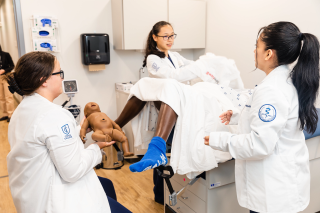The Ithaca College MS-PAS program is committed to providing learners with a learner centered educational environment where they will receive the requisite medical knowledge to provide culturally sensitive, empathic, patient-centered, evidence-based medical care in an interprofessional healthcare team.
Learner success in achieving the program learning outcomes and expectations will be evaluated through a variety of assessment tools such as: multiple choice examinations, interprofessional collaborative group activities and projects, objective structured clinical examinations (OSCEs), reflection journals, clinical performance evaluations, clinical preceptor evaluations and a graduate project.
The Ithaca College MS-PAS learning outcomes and expectations are based on the Competencies for the Physician Assistant Profession as developed jointly by the National Commission on Accreditation of Physician Assistant (NCCPA), the Accreditation Review Commission for Education of the Physician Assistant (ARC-PA), the Physician Assistant Education Association (PAEA), and the American Academy of Physician Assistant (AAPA).
Upon completion of the Ithaca College MS-PAS program, graduates will demonstrate entry-level proficiency as Physician Assistants in the following domains: Medical Knowledge, Clinical Reasoning and Problem-Solving Skills, Interpersonal Skills, Clinical and Technical Skills, Professional Behaviors, Leadership & Advocacy for Healthcare Equity and Access.

